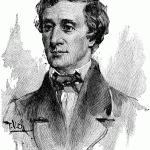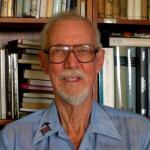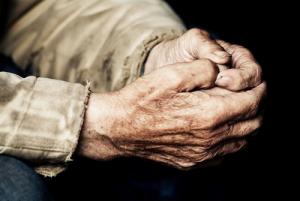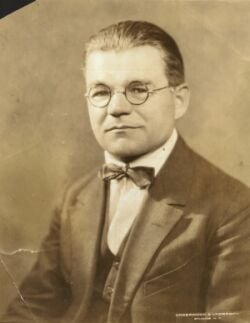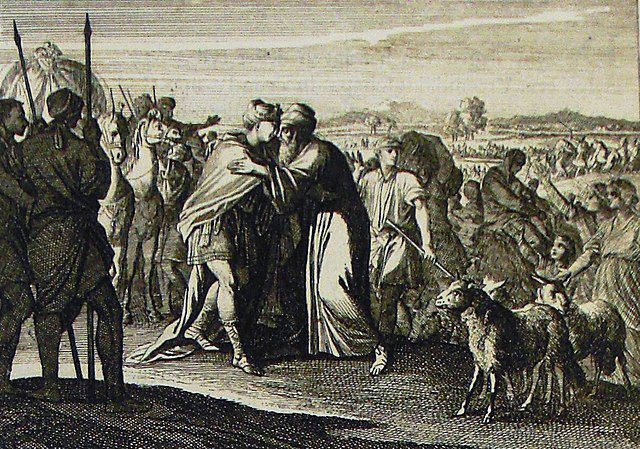
Caspar Luyken (17th century)
In digging through my files I notice every few years I share an ongoing thread of thoughts about Father’s Day. Some points I repeat. Others get dropped. While still others call for deeper consideration. I think of this project as a sort of spiritual discipline.
As far as the history of it goes, the idea of honoring fathers is pretty old and exists around the world one way or another. The Christian world has honored fathers at least nominally for a very long time. The Coptic church which today is centered in Egypt & Ethiopia have celebrated a Father’s Day connected to the Feast of St Joseph, Jesus’s, how shall we say, earthly father, possibly since as long ago as the early fifth century. In the Coptic church the feast is observed on July 20th. The Latin Church, meaning the church mainly of Europe, has done the same thing. Attaching Father’s Day to the festival for St Joseph since the Middle Ages, although on their own date for celebrating St Joseph, the 19th of March.
Looking around the world Father’s Day isn’t officially celebrated in China. Although I gather there are less formal observances here and there. Apparently, the same is true in India, with some local observances, but it’s not a national holiday. Roaming around the interwebs, the only reference I could find to Father’s Day celebrations in sub-Sahara Africa is South Africa. They also mark it as an official holiday. I think a deeper look will find others on the mother continent who also observe the day. You can consider it a small research assignment, if you want.
According to a source I found online, apparently in Germany many men take Father’s Day as a drinking event, while in Russia the holiday is enmeshed with martial celebrations of the “Fatherland.” Both of which open doors to the problematic and offer more reasons why it might feel attenuated in our own time and place.
Our American holiday seems to have been conceived as a complement to Mother’s Day. The earliest official celebration dates from 1910, when after years of lobbying Sonora Scott Dodd got Washington State to designate June 10th as a celebration for all things father. There was an attempt to create a Federal holiday in 1916. But it was met with resistance in congress who appear to have feared it becoming too commercial. I have to admit I don’t think of congress as being generally aware that such a thing could ever be problematic. In 1966 Lyndon Johnson issued a presidential proclamation stating Father’s Day should be observed on the 3rd Sunday in June. And, finally, in 1972 congress passed legislation making this official, and it was signed into law by Richard Nixon.
As to the designation Father’s with that apostrophe. For the grammarians among us, while the presence of that apostrophe has generated some controversy, it is the official designation. Please take notes. There could be a test, later.
Like for Mother’s Day this is a fraught holiday. Drunken fathers, abusive fathers, absent fathers crowd up in the heart along with loving and attentive and caring fathers. And. Fathers, like mothers, well, we all have one. Some are good, some are bad, many are indifferent. But, and this is really important: they loom so large in our consciousness and the stories we tell about ourselves that it can be overwhelming.
So, reflecting on this holiday is messy. Did I use the word fraught? We can see why a last-minute card or necktie can be the popular option for addressing it.
Me, I’m certainly not immune to the mess and the complicated feelings. My father had a rough life. Orphaned very young, passed around among relatives, until deemed incorrigible and institutionalized, ran away, as a young teen lived on New York’s streets, got into petty crime, maybe more serious crimes, as the second world war began ended up in prison, then in the last year of the war released into the Army, served as a medic, where he was badly, badly damaged.
The man I knew was disabled, he’d lost use of an arm to the war, an out of control alcoholic, in and out of jail, dreamer, wisher, wanter of better and bigger things. He wanted to be an Irish Frank Sinatra. Not the singer part, the cool man of the world part, the hip part. He wanted to be classy, but only understood it has having and spending money. Which was always just a little beyond him. Betrayed his family over and over again. And. And this is so important. Throughout my childhood he relentlessly told me how good I was, and how he loved me. Oh, and one more thing. While having maybe a third-grade education, he was an avid reader. And his encouragement, and probably more importantly his example illustrated by a pile of books at his bedside led me to a life of books. So. Complicated.
And there are more complexities. For me and for many here, I suspect, the mess of culture and everything that can be dropped into the term “patriarchy” poisons the water into which our celebration of fathers would be mixed. I’ve spent pretty much my entire ministerial career looking into my own heart, looking at the larger culture, and out of that acting from a desire to genuinely represent the truth that “women hold up half the sky.” And as we’ve been so immersed in a world where even our language is weighted with masculine terms as baseline, as normative, my work has been focused mostly on holding up women as whole, and as strong, and as leaders. And with that, as this is a spiritual project, casting light on all the many aspects of the feminine as divine.
Let’s be frank. That work is not done. Nowhere near done.
Although even at this moment we can see how we have all been enriched in this process. And we keep learning. All of us. Me, I’m really glad how this work has continued and has gone on to expose the deep problems with any binary reductionism of our sexuality. We not only all exist on a continuum rather than what our immediate physical attributes suggest, but how our basic identities can and usually do fit in more than one of two places. We not only slide along that continuum we encompass the whole glorious mess.
That acknowledged, I feel a need to pause here. And turn into and reflect just a little on fathers, on that particular spot on the continuum of human existence.
Today is Father’s Day.
What about fathers after God the father, after the man as the head of household? What about fathers as something more than a biological necessity to get the family thing going? (Well, with scientific advances, at least for the time being.)
So. My father. Your father. Our fathers. Those of us who are fathers. And that part of all of us which might be named father or fathering. What about it? Again, as this is a spiritual reflection, and we have such limited time, what I really want to dig into, if just a little (and, don’t worry about what I said earlier. There will be no test) is what can we find in the idea of the father, in that specific part of our human identity that is worthy of our deeper reflection?
Fathers. Both Freud and Jung had a field day with the idea of the father. We even have a term for it, “father complex.” And complex it is. With Freud there is a contention between a father and a son. Jung mixes it up a bit more and broadens the possibilities, for men and women, and for both good and ill. While I think Freud gets a bit of a bad rap that he only partially deserves, I find I’m nonetheless more attracted to the work of Carl Jung.
However, to be clear, I’m not a Jungian. I do not believe in the collective unconscious, nor any kind of Platonic or quasi or semi archetypal realm. Certainly not in a literal sense. And, as our ancestor Ralph Waldo Emerson warned about avoiding foolish consistencies, if we hold the idea of archetypes lightly, say as identifiable regularly occurring patterns of relationships both within our individual hearts and within our communal lives, I believe there is something to see. It might even reveal what we want to hold up. and what we might want to correct. So, there are things to explore.
From Freud and Jung people have spent a lot of time digging into the absence part of fathers and fathering. Certainly, absent was signal feature of my own upbringing. And with that there’s another term “father hunger.” It has been examined from the perspectives of both women and men. For all of us that father hunger speaks to another aspect of absence: longing. There seems a great longing for that aspect of parenting we call fathering.
And here I find something deeply compelling. James Hillman is particularly important to me. Hillman, who, as long as we’re talking about complex relationships with one’s father, is an interesting example of someone who has taken his spiritual father, Carl Jung, starting as his heir at the Jung Institute in Zurich, then proceeding to dismantle much of his mentor’s work. That is until the powers that be within the organization noticed and rather forcibly invited Mr Hillman to move on.
Hillman spent some serious time thinking about fathers, and absence. He reflected on this idea of the missing father, physically for some, metaphorically for others, that captures so many of our imaginations. Hillman observed how this missing father, “is not (simply) your or my personal father. He is the absent father of our culture, the (to use a Jungian term) the viable senex who provides not only daily bread but spirit through meaning and order.” The “senex” in archetypal language is the “wise old man,” our image, usually although not exclusively, our positive image of what a man can grow into. The sad thing is that this figure is increasingly experienced as something missing.
That observation makes me think a lot of things. One is that longing itself. I know everyone in this room doesn’t feel this way, but I believe I am not alone in that sense of longing for the father. Maybe, probably, not the actual father of the flesh, my father in the flesh, besides being dead, is as I briefly listed a complicated, and not particularly lovable figure. But, rather, with Hillman, I am interested in the father writ large. As well as the part of the father I don’t see in my own existence. And with that our collective desires, our communal lives, and what we need. And what we seek, either consciously or unconsciously.
I think there is legitimately a longing for that senex figure, that wise man, and the traits that are traditionally associated with him. Specifically, this father not only supports us physically, providing food and clothing and shelter, he embodies kindness. He offers sound judgments on events that are confronting us. He brings a unique wisdom to the matter at hand, whatever it might be. I like that this senex father image also carries with it hints of otherness.
So, the invitation is to look within and among us for those traits that our hearts long for. And what are they? That physical support symbolized by paying the rent and putting food on the table. That emotional support, which we find as perspective, and, to use a term not so common these days, grit. Of course, we also want to avoid the bad father things. And, oh, my, there are such a lot of them. Cruelty. Heavy judgment. Abandonment. In some myths the father actually devours us. In others he is a fool.
So, cutting through these things that are not helpful, noticing them, but not stopping there, and instead going for the heart, going for that other style of parenting, another angle on nurturing. And with that a question. Okay, maybe it turns out there is a test. But its take home. How do we own fathering as a part of our spiritual journey?
In short, as we genuinely ask when we hold up women, when we hold up LGBTQ people, when we hold up people of color, when we hold up immigrants, when we hold up anyone who might be considered other: how do we become whole people?
And the answer, well, this is my answer. But you might find it helpful. Kind of looking over the shoulder of your neighbor when taking a test. And this take home test is actually open book. My answer to the question of how to become whole is simply by seeing, simply by noticing what is, both as it arises around us, and as it arises within us. Just witness. Then, once we have noticed it, we never see it all, but we can see the big parts, and oh my, fathers, they are a big part – then, by wise discernment of what is useful and what is not, we can move toward integrating.
If this seems an awful lot for a take home exam, even open book, don’t worry we each of us have a whole lifetime to finish it.
So. All this explored. All this laid out. What’s a father’s love? So complex, so complicated. Me, I think of my father’s life and, well, his death, all that passed in between taken together, may well contain a hint at the whole of it, and with that at the whole of our lives. Failures large and small. Successes, maybe more small than large. Mistakes and foolishnesses. And, glued together with some sense of love.
Love. Open ended. Messy. Filled with mistakes and wrong turns. And something so beautiful, so beautiful. The mysteries of our humanity.



